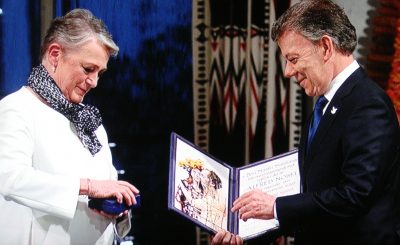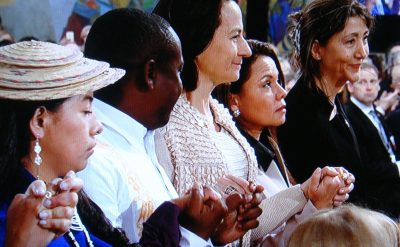Alfred Nobel’s intentions for awarding a peace prize were all met when this year’s prize went to Colombian President Juan Manuel Santos on behalf of the Colombian people. That was the overall conclusion drawn on Saturday by both the prizewinner, the Norwegian Nobel Committee and others who have called it “a classic prize.”

The Norwegian committee members have grown defensive in recent years after criticism that many prizes have not met the terms of benefactor Alfred Nobel’s will. Berit Reiss-Andersen, who was representing the committee this weekend, went on the offensive in her speech at Saturday’s Nobel Peace Prize ceremony in Oslo. She met the committee’s critics head-on Saturday when she stated that all forms of peace work outlined by Nobel (contributions to fraternity between nations, to the abolition or reduction of standing armies, or to the holding and promotion of peace congresses) were represented when Santos won this year’s prize for helping to end a 52-year-old armed conflict with FARC guerrillas in Colombia.
‘In the spirit of Nobel’s will’
Santos agreed, for example, that the peace process in Colombia has already fostered fraternity both within his country and with other countries in the region. He noted in his acceptance speech, which followed Reiss-Andersen’s remarks, that there now are no armed conflicts in the Americas, “from Alaska to Patagonia.” He thanked countries including Cuba, Venezuela and Chile for their help during the past several years of peace talks, and noted how ending the civil war with FARC also lessens tensions for Colombia’s neighbours.
Reiss-Andersen also pointed to not only a reduction but the actual disarming of the FARC guerrillas, under terms of the peace pact reached with the Norwegian government’s assistance as well. FARC will no longer exist as a de facto army when its roughly 7,000 soldiers turn over their arms. The surrender and destruction of their weapons will be overseen by the UN and the intention is for Colombia’s ELN guerrillas to do the same. Reiss-Andersen took the opportunity to send a message to Santos at the same time: “It is the committee’s hope that the peace accord will also enable the (Colombian) government to reduce its military expenditure and thereby release funds that can be spent on building peace and welfare in Colombia,” instead of the army.
The Colombian peace process itself “has in many ways served as a continual national peace congress,” Reiss-Andersen added. It included not just negotiations stretching over more than four years but also “long and intense talks” during which both sides in the conflict were confronted with the violence subjected upon civilian victims. “The award of the Peace Prize to President Santos thus absolutely fulfills the criteria and the spirit of Aldred Nobel’s will,” she said.
FARC leader praised, too
Reiss-Andersen made a point of how the Nobel Peace Prize was awarded to Santos alone, for his “resolute and courageous efforts” to bring an end to the country’s civil war. “But it is also intended as a tribute to the Colombian people,” she said, “who despite great hardships and countless injustices have never given up hope of a just peace.” She also cited “tireless negotiators, facilitators, diplomats, politicians and, of course, leaders from the (Colombian) government and the FARC guerrillas,” with special emphasis on the civil war’s victims “who carry their own painful stories yet manage to represent other victims as well.” Reiss-Andersen specifically commended FARC guerrilla leader Rodrigo Londono who “so clearly, and unreservedly” expressed regret for the suffering that the FARC inflicted on the civilian population and asked the Colombian people for their forgiveness. “This is an example to be followed,” Reiss-Andersen said.

Santos echoed many of her comments in his own impassioned and lengthy acceptance speech, which was delivered in Spanish and included a poignant interlude during which he introduced several representatives of victims of the civil war. They included Leynar Palacios, who lost 32 relatives when FARC bombed the church in his hometown, and, most famously, Ingrid Betancourt, the Colombian-French politician who was kidnapped and held captive for six years. They all stood up, holding hands, to loud applause.
Santos himself also received a long standing ovation from the audience in Oslo’s City Hall that included royalty, government leaders, ambassadors based in the Norwegian capital and many diplomats who were involved in the Colombian peace process. Former US Secretary of State Henry Kissinger was also there, and due to take part in a discussion on peace efforts on Sunday.
Some members of the audience, including Santos’ own family, were visibly drawn to tears by his speech, during which he thanked them and many others for their support. He cited one of his former professors at Harvard University who taught him to “talk with victims” to get the “push and strength to keep going.” He also cited fellow Nobel Laureate Bob Dylan, who won this year’s Nobel Prize for Literature, “that too many people have died” in conflicts.
Santos also issued calls to reform the war on drugs, noting that it “has not been won.” He praised diversity, criticized efforts to close borders to refugees and immigrants, and hailed former Noble Peace Prize winners who have fought to eliminate land mines and halt climate change.
To read the text of the newest Nobel Laureate’s remarks click here (external link).
Some critics, including a Colombian refugee who now lives in Oslo, complained to Norwegian Broadcasting (NRK) afterwards that Santos did not sufficiently address the atrocities also inflicted by government troops during the long civil war. They noted that both FARC and government forces have blood on their hands and that the government must apologize just as much as FARC. Santos touched on that during Friday’s press conference, and noted how both sides in the conflict have been confronted with victims of the atrocities. The need for regret applies to both, and he stressed the need for FARC victims to forgive.
Santos was having a memorable, if busy, weekend in Oslo, which started with an appearance at a children’s peace demonstration outside the city hall and included a private meeting with the royal family. He would be hailed with a torchlight parade Saturday evening, followed by the Nobel Banquet at the Grand Hotel. Nobel Days events end on Sunday with a round of official meetings and a concert Sunday evening.
newsinenglish.no/Nina Berglund

